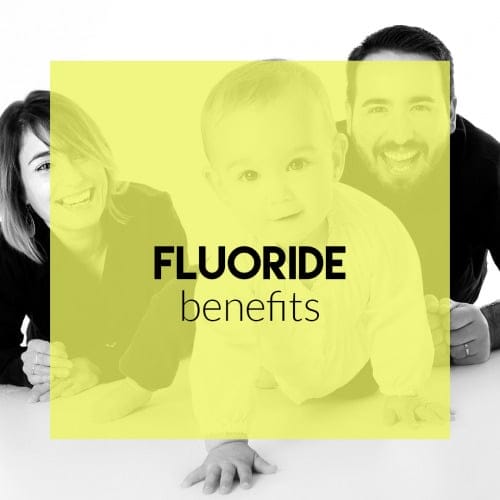
Saliva contains calcium and phosphates which coat your teeth to form a protective barrier. When we eat foods like bread, crackers and sugary treats, oral bacteria feasts on the carbohydrates and produces acid that removes the calcium and phosphate from tooth enamel, leaving your teeth vulnerable to decay.
Your saliva continues to fight the bacteria by replacing the stripped away calcium and phosphate. A question we get asked very often from, “is fluoride safe?” Yes, fluoride is 100% safe and beneficial. When the saliva also contains fluoride you’ve taken in from food, water and toothpaste, your teeth are much better protected. Here’s why.
Fluoride is a mineral that is often called nature’s cavity fighter. This is because it helps make tooth enamel more resistant to the harmful acids that form in our mouths when we eat. Fluoride combines with calcium and phosphate to create fluoroapatite. Fluoroapatite binds with tooth enamel to form a powerful defense system. An amazing benefit of fluoride is that it can repair small cavities.
Fluoride Benefits for Children
Fluoride is an essential mineral for teeth and bones. As children’s teeth erupt and develop, fluoride helps strengthen the enamel to fight against the causes of tooth decay. This is especially important as permanent teeth replace primary teeth.
Fluoride Benefits for Older Adults
As our bodies ages, the risk for tooth decay increases. Seniors are more likely to experience receding gums, which can expose the root surface. Dry mouth caused by certain medications can also reduce the amount of saliva available to protect teeth. Fluoride can help in the fight against tooth decay for older adults. It is also helpful in the treatment of bone loss, which can be an issue for post-menopausal women.
How to Incorporate Fluoride Into Your Dental Care
You can either ingest or apply fluoride topically to your teeth. How much fluoride you need is based on your age and whether your drinking water contains the mineral. In general, daily consumption guidelines are:
- Adults: 3 to 4 milligrams.
- Children (ages 4 to 13): Two milligrams.
- Younger Children: No more than half a milligram.
Here are the best ways to make sure you and your family are getting enough fluoride.
Food and Drinks
You get most of the fluoride you need from the foods and water you consume. Foods rich in dietary fluoride include spinach, tomato, asparagus, bean, peas, cucumber, dill, grapes, oranges and apples, to name a few. Most public water supplies contain added fluoride.
Toothpaste and Mouthwash
Dental care products approved by the American Dental Association (ADA) contain fluoride. You will know you are choosing the right toothpaste and mouthwash when you see the ADA seal on the label.
Treatment
Your dentist may recommend topical treatments that apply fluoride directly to your teeth with a gel, foam or rinse. If fluoride is not added to your local water supply, your dentist may recommend fluoride supplements if needed.
The benefits of fluoride are too important to ignore. Are you not sure if you or your family members are getting enough fluoride? We are happy to help! Call us at Shorewood Family Dental Care today at 815-725-5991!.




